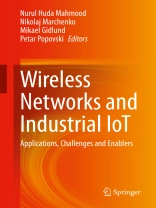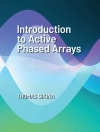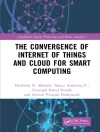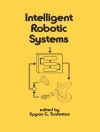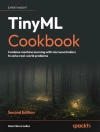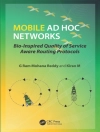This book provides a comprehensive overview of the most relevant research and standardization results in the area of wireless networking for Industrial Io T, covering both critical and massive connectivity. Most chapters in this book are intended to serve as short tutorials of particular topics, highlighting the main developments and ideas, as well as giving an outlook of the upcoming research challenges.
The book is divided into four parts. The first part focuses on challenges, enablers and standardization efforts for reliable low-latency communication in Industrial Io T networks. The next part focuses on massive Io T, which requires cost- and energy-efficient technology components to efficiently connect a massive number of low-cost Io T devices. The third part covers three enabling technologies in the context of Industrial Io T: Security, Machine Learning/Artificial Intelligence and Edge Computing. These enablers are applicable to both connectivity types, critical and massive Io T. The last part covers aspects of Industrial Io T related to connected transportation that are important in, for example, warehouse and port logistics, product delivery and transportation among industries.
- Presents a comprehensive guide to concepts and research challenges in wireless networking for Industrial Io T;
- Includes an introduction and overview of such topics as 3GPP standardization for Industrial Io T, Time Sensitive Networking, system dependability over wireless networks, energy-efficient wireless networks, Io T security, ML/AI for Industrial Io T and connected transportation systems;
- Features contributions by well-recognized experts from both academia and industry.
Mục lục
Introduction.- Categorization of Io T, main KPIs.- Part I: Wireless Io T Systems.- Intelligent Transport System.- Wireless Isochronous Real Time networks/Industrial control networks.- Unmanned Aerial Vehicle Networks.- Part II: Io T communication.- Traffic modelling and measurement framework for Io T.- Random access for Io T.- Part III: Technologies for Massive Io T.- Massive IIo T LPWAN systems.- Energy efficient massive Io T.- Data centric solutions for Iio T.- Part IV: Technologies for Critical and Broadband Io T.- Approaches for improved reliability in Industrial environment.- Application of Multi-Access Edge Computing in Industry 4.0.- Security challenges in critical Io T.- Machine Learning/AI as Io T enablers.- Channel models in industrial scenarios.- Time Sensitive Networking for wireless industrial control networks.- Network Slicing for IIo T.- Conclusion.
Giới thiệu về tác giả
Nurul Huda Mahmood was born in Bangladesh. He received the Ph.D. degree in Communications Theory from Norwegian University of Science and Technology (NTNU), Norway in 2013. From 2012 – 2018, Nurul was with the Wireless Communication Networks (WCN) section at Aalborg University (AAU) involved in teaching and research activities, where he last held the position of an Associate Professor. He also served as an external research contractor with Nokia Bell Labs in Aalborg during his stay at AAU. Currently Nurul is a Senior Research Fellow at Center for Wireless Communication (CWC), University of Oulu, where he is part of the Machine-type Wireless Communications research group and involved in the 6G Flagship program. He has authored/co-authored more than 60 peer-reviewed publications and holds about 10 patents and patent applications. Nurul Huda’s research interests include resource optimization techniques with focus on URLLC, and modelling and performance analysis of wireless communication systems.
Mikael Gidlund received the M.Sc. and Ph.D. degrees in electrical engineering from Mid Sweden University, Sundsvall, Sweden, in 2000 and 2005, respectively. In 2005, he was a Visiting Researcher with the Department of Informatics, University of Bergen, Bergen, Norway. From 2006 to 2007, he was a Research Engineer and a Project Manager with Acreo AB, Kista, Sweden, where he was responsible for wireless broadband communication. From 2007 to 2008, he was a Senior Specialist and a Project Manager with Nera Networks AS, Bergen, where he was responsible for next-generation IP-based radio solutions. From 2008 to 2013, he was a Senior Principal Scientist and a Global Research Area Coordinator of wireless technologies with ABB Corporate Research, Västerås, Sweden, where he was responsible for technology and strategy plans, standardization, and innovation in the wireless automation area. He has pioneered the area of industrial wireless sensor network. Since 2014, he has been a Full Professor of computer engineering with Mid Sweden University. He has authored or co-authored over 100 scientific publications in refereed journals and conferences. He holds over 20 patents (granted and pending applications) in the area of wireless communications. His current research interests include wireless communication and networks, wireless sensor networks, medium access protocols, and security. Dr. Gidlund received the Best Paper Award at the IEEE International Conference on Industrial IT in 2014. He is currently the Vice-Chair of the IEEE IES Technical committee on Cloud and Wireless Systems for Industrial Applications. He is an Associate Editor of the IEEE TRANSACTION ON INDUSTRIAL INFORMATICS, Journal of Information Processing Systems and area editor for SENSORS (MDPI).
Nikolaj Marchenko acquired his Ph D in Information Technology from University of Klagenfurt, Austria, and his Diploma Degree in Computer Engineering from RWTH University Aachen, Germany. He currently works as Research Engineer at Robert Bosch Gmb H, Renningen, Germany. His main research focus is on Io T and Wireless Communication for Industry 4.0, in particular on low-latency and high reliability control traffic and its integration with 5G networks.
Petar Popovski is a Professor of Wireless Communications with Aalborg University. He received his Dipl. Ing and Magist. Ing. degrees in communication engineering from the University of Sts. Cyril and Methodius in Skopje and the Ph.D. degree from Aalborg University in 2005. He has over 300 publications in journals, conference proceedings, and edited books. He is featured in the list of Highly Cited Researchers 2018, compiled by Web of Science. He holds over 30 patents and patent applications. Prof. Popovski is a Fellow of IEEE. He received an ERC Consolidator Grant (2015), the Danish Elite Researcher award (2016), IEEE Fred W. Ellersick prize (2016) and IEEE Stephen O. Rice prize (2018). He is currently a Member at Large at the Board of Governors in IEEE Communication Society. Prof. Popovski is a Steering Committee Member of IEEE Smart Grid Comm and IEEE TRANSACTIONS ON GREEN COMMUNICATIONS AND NETWORKING. He previously served as a Steering Committee Member of the IEEE INTERNET OF THINGS JOURNAL. He is currently an Area Editor of the IEEE TRANSACTIONS ON WIRELESS COMMUNICATIONS. Prof. Popovski is the General Chair for IEEE Smart Grid Comm 2018 and IEEE Communication Theory Workshop 2019. His research interests are in the area of wireless communication and communication theory.
